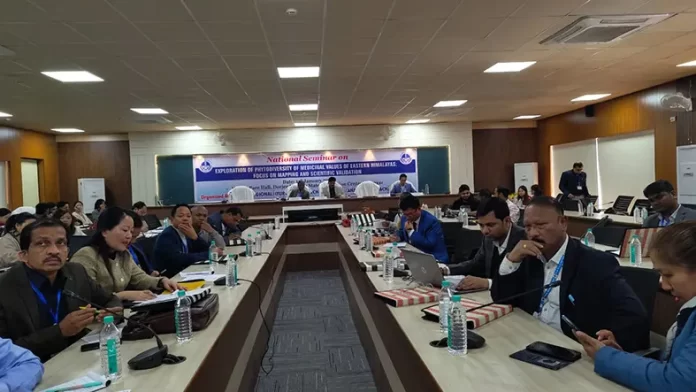[Apasi Linggi and Kara Gambo]
ITANAGAR, 11 Jan: The Regional Ayurveda Research Institute, Itanagar, hosted a national seminar titled ‘Exploration of phytodiversity of medicinal values of eastern Himalayas: Focus on mapping & scientific validation’ at Dorjee Khandu State Convention Centre here on Saturday.
The event, organised under the aegis of the AYUSH ministry, brought together researchers, academicians, and policymakers to discuss the region’s rich medicinal biodiversity and its potential for pharmacological and traditional applications.
The seminar was inaugurated by Health Commissioner Pawan Kumar Sain and Central Council for Research in Ayurvedic Sciences (CCRAS) Director General Prof Vaidya Rabinarayan Acharya.
It emphasised the need to integrate traditional knowledge with modern scientific methodologies for global recognition and utilisation.
Pasighat (E/Siang)-based North Eastern Institute of Ayurveda & Folk Medicine Research’s Director Dr Robindra Teron and CCRAS Deputy Director General Dr Narayanam Srikanth also addressed the gathering, highlighting the significance of conservation efforts and the importance of medico-ethno botanical surveys in the eastern Himalayan region.
The event featured two technical sessions, with topics ranging from the conservation of rare medicinal plants to ethnic dietary practices and mapping medicinal flora in Arunachal Pradesh’ forest divisions.
Experts such as Prof Pulok Kumar Mukherjee of Jadavpur University and Prof Hui Tag of Rajiv Gandhi Central University shared their insights.
Health Commissioner Sain stressed on the importance of engaging with grassroots communities for environmental initiatives, rather than relying solely on classroom-style sessions and PowerPoint presentations.
Speaking during the event, Sain highlighted the invaluable knowledge locals possess about plants and their benefits gained through generations of living in harmony with the environment.
He suggested a two-step approach: first, mapping plants with potential benefits, and then conducting scientific validation to ensure sustainable development that would benefit both the people and the state.
A panel discussion was held, allowing the participants to interact with the dignitaries and discuss sustainable strategies for preserving endangered species and documenting indigenous knowledge.
The seminar also focused on the importance of protecting cultural heritage by safeguarding traditional medicinal practices, and highlighted ethnic dietary traditions, underlining their contribution to wellness. With its breathtaking biodiversity, the eastern Himalayas continue to inspire scientific exploration. The seminar reiterated the necessity of blending indigenous practices with contemporary research to promote sustainable development in Arunachal.




